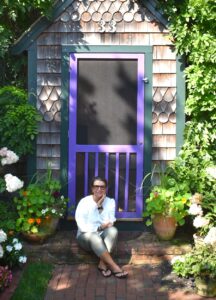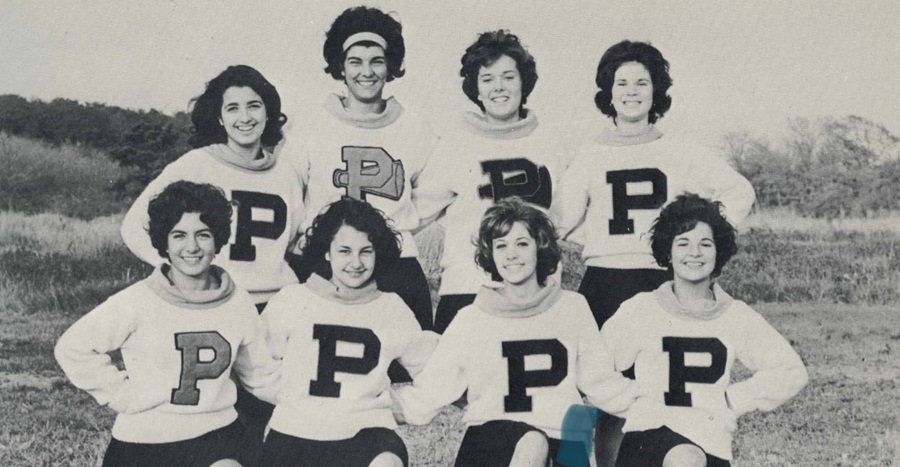Mary Beck is sitting on the couch in the living room of her corner house in the West End. She’s a little hidden behind her oversize rectangular sunglasses. Beck is one of those rare people who grew up in Provincetown and decided to stay. And that’s made her a witness to important eras of this ever-evolving town.
Beck is known as the “grand dame” of Veterans Memorial Elementary School — she spent 39 years teaching in the Provincetown schools. She and her husband, Eric, a retired science teacher at the high school, bought their house at the end of Nickerson Street in 1974. Neither was interested in becoming the principal, she says: “We loved teaching.”

The Becks raised their three children in this house. Her daughter, Myya Baum, who graduated from Provincetown High in 1998, has stayed local. She owns Wellfleet’s Heart Core Studios, where she is a fitness guru. “She reinvented herself to stay here,” Beck says of her daughter. Beck says many of those who grew up in town don’t stay because of the “same old problem — people can’t afford to live here.”
The Becks rent a row of apartments behind their house to longtime Provincetown artists and service workers at a fair rate. “There are three year-round apartments and four summer ones,” says Mary. “Hard to believe there’s seven apartments there.” They’re small, but people appreciate the chance to live by themselves, she says. What’s now a yard next door used to be a pasture for horses.
Beck remembers the days when the town was a thriving fishing village. Her father, Louis A. Salvador, whose parents emigrated from Portugal, was a fisherman in town from the 1920s through the 1970s. His dragger, Shirley & Roland, was named for his first two children.
When she was young, Beck didn’t worry much about her father being at sea. “But I should have — they didn’t have the technology they do now,” she says. “They didn’t know when the storms were coming.” When storms blew in, her mother would light candles on the dining table of their house at 11 Johnson St. and have them pray. “We dropped to our knees,” says Beck.
“I didn’t realize the danger of that job until I was in my 20s or 30s,” she says. When she was a kid, her father took her on small fishing trips in summer. And she and her brother would pour Four Roses whiskey for the fishermen who stopped by the house on Fridays. Beck also wrote the weekly checks for the crew — that’s how she learned how to balance a checkbook.
Beck recalls eating fish that was caught that day and prepared by her mother, Agnes Jackett Salvador, on a dining table covered in newspaper. “We ate things most people would throw away,” she says. She and her mother drove out to Herring Cove — “New Beach” back then — to see if her father and Uncle Fred were on their way home from the sea. Her mother had the gift of recognizing boats from afar by their masts.
In those days, “The boys would fish, and the girls would knit,” she says. Beck learned how to knit from the girls in a knitting club who donated their used yarn scraps to her. She still keeps a sewing machine and a loom in her second-floor studio.

Beck remembers the town’s bohemian heyday in the 1960s. “It was beatniks, hippies, fun — it kills me when people criticize Provincetown the way it is now,” she says. “People talk about change. We went through all those changes in the ’60s with the leather shops and the plastic chickens.” The way Beck sees it, Provincetown has never been more beautiful than it is now.
Beck grew up as one of four Salvador children. One brother, David, was “quite notorious,” she says, smuggling hashish from Morocco on a big sailboat. David Dunlap, in Building Provincetown, calls David Salvador “the last of the town’s true buccaneers, a worthy heir to the rum-running Capt. Manuel Zora.”
“He went from Morocco to the Azores and then sailed across the Atlantic,” says Beck. “The boat was hit by a storm and lost power. They had to pull into Nova Scotia, and the Coast Guard started to board the ship to help.” It seems that Salvador and his crew torched the hashish but didn’t manage to burn it all. “They all got arrested.”
David Salvador was in jail for a while but escaped, Beck says. He spent time on the lam before surrendering to serve out his time. “He snuck into town a couple of times to see my parents,” she recalls. According to Dunlap, he snuck in for his parents’ 50th wedding anniversary. He died in 2012. A year before that, Salvador told Dunlap, “I led a real James Bond life for 15 years. I wouldn’t swap a minute of it.”

“As a kid growing up, I couldn’t wait to leave,” Beck says. She met her husband at tiny, now-closed Westmar College in Iowa. And it was Eric who drew her back to town: “Every time Eric came back with me to Provincetown, he fell in love with it a little bit more,” she says.
At Veterans Memorial Elementary, Beck raised a town. She was 20 when she started there in 1971. “I like children,” she says. “Kids let you know when they’re mad, sad, or happy — there’s no guessing.”
Beck was already retired by the time the elementary school moved over to the old high school building. “I was apprehensive about those little guys being in that big building and climbing those stairs,” she says. But she was comforted when she walked into the new school and saw the elementary students’ artwork and heard their voices in the hallway.
She still gets a thrill when she sees students she had years ago all grown up. “I can usually pick them out,” she says. “I love when they come up to me.”
Beck looks forward to the off-season ahead. “I love the desolate feeling of Provincetown in the winter,” she says. She’ll read, knit, and play the ukulele. Eric will make his collages. And aside from a few trips to see her grandchildren in Maine, the Grand Dame of Veterans Memorial Elementary School is not going anywhere.



